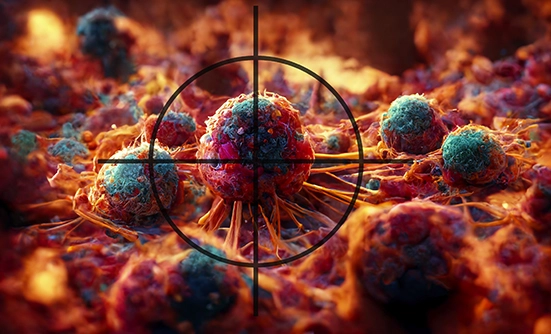Genetic testing. Genomic testing. Molecular profiling. Biomarker testing. Germline testing. Inherited mutation testing. Somatic tumor testing. Pathogenic variant. Variant of uncertain significance. Do patients need to know any of these terms, and do they all mean the same thing or different things? How can patients make sense of all these terms and be sure they get the right test to ensure they receive the best available treatment?
Precision Medicine and Testing
In the era of precision medicine, or personalized medicine, patients and their family members often encounter some or all of these terms in discussions with doctors, oncology nurses, navigators, advocacy groups, or while doing their own research online looking for answers.
Some of these testing terms and testing results are indeed interchangeable. Others are not. Advocacy groups, professional societies, healthcare providers, and pharmaceutical industry representatives supporting patients with cancer have found that confusion among patients and even among providers and oncologists about these terms has led to the underuse of some cancer tests, which can be an obstacle to having patients receive the best therapy available at the time for the particular disease features of each patient with cancer.
We now know that not all lung cancers or all breast cancers are the same. Specific biologic changes, in the genes, cell protein, and other changes in the makeup of the cancer cells in each person affect the behavior of the tumor and, therefore, require a different type of treatment. Understanding the nuances of the cancer requires the right testing at the right time for each patient.

“Genetic testing and genomic testing are really complicated, and it’s getting more complicated daily, it seems. As a result, there’s a lot of confusion about what test any one patient has had, and a lot of confusion around the language that is used to describe testing,” said Rachel Shapira, ScM, LCGC, Genetic Counselor with the University of California, Los Angeles, and a Working Group representative of the National Society of Genetic Counselors, in an interview.
Inconsistent Terms Affect Patient Outcomes
To help allay some of the confusion, overcome obstacles to patients receiving the benefits of precision medicine, and establish a consistent terminology landscape across different cancer types, a national consortium of 21 patient advocacy groups representing solid tumors and blood cancers; 3 professional societies, including the Association of Molecular Pathology, the Association of Community Cancer Centers, and the National Society of Genetic Counselors; and 18 pharmaceutical companies, diagnostic companies, and laboratories established the Consistent Testing Terminology Working Group.
The Working Group identified patient confusion from inconsistent testing terminology as a potential cause for the current underuse of advanced diagnostic testing for molecular analysis of a patient’s cancer.
The goal of the Working Group was to evaluate and adopt consistent terms for testing for acquired (somatic) mutations and inherited (germline) mutations that the healthcare community can use when communicating with patients. The group did extensive research on the topic and identified at least 33 different terms related to biomarker, genetic, and genomic testing that are used in the education and clinical care of patients with cancer.
The variability in terminology is complicated by the availability of many testing modalities and gene mutations and other genetic markers (biomarkers) that are being tested today for different types of cancer.

“We were worried, because we heard from patients that they didn’t understand whether they had had testing done, and they didn’t know how to talk to their doctors about it, because there was such a mishmash of terms being thrown at them through patient education from industry, patient advocacy groups, and the providers themselves,” said Nikki Martin, Director of Precision Medicine Initiatives at the LUNGevity Foundation, a nonprofit organization focusing on patients with lung cancer.
Consistent terminology for the different cancer tests is needed “to reduce patient confusion, improve communication, facilitate shared decision-making, and ensure concordance in policy development,” Ms. Martin added.
Having consistent testing terminology will help patients become better informed about the types of testing they may need at diagnosis, and then again during disease progression or during cancer recurrence (coming back).
“While ‘biomarker testing’ is broader than ‘genomic testing,’ it’s an inclusive term that incorporates new biomarkers that are added on to the testing regimen for patients with cancer,” Ms. Martin said. “Patients will have only one term that they see consistently across multiple vehicles of communication,” she pointed out.
“The goal of using consistent testing terminology is to establish biomarker testing as part of the standard of care, said Elissa Quinn, Associate Director of Precision Medicine at Blueprint Medicines, in an interview.
“We’re committed to overcoming multiple barriers, including helping patients and their care team communicate effectively about biomarker testing, ordering the right test at the right time, and enabling insurance coverage for testing, to advance patient care,” Ms. Quinn said.
The 3 Key Testing Terms
After multiple discussions, the members of the Working Group agreed on umbrella terms to distinguish between acquired (or somatic) and inherited (germline) testing for patients, and for testing of people who are at risk for inherited gene mutations or other gene abnormalities, such as changes in cell protein and gene fusion or translocations.
The Working Group agreed on the key following 3 cancer testing terms:
- Biomarker testing.
Biomarker testing means the analysis of a patient’s tissue and/or blood for specific driver mutations, multiple gene alterations, and/or non-genomic biomarkers (such as protein expression), with no relation to anything inherited within a family. - Genetic testing for inherited mutations.
Genetic testing refers to testing for inherited (germline) mutations in patients who have already been diagnosed with cancer that involves genetic or inherited mutations. - Genetic testing for inherited cancer
risk.
Genetic testing for cancer risk is used for people who have not been diagnosed with cancer but who are at risk of having an inherited (germline) genetic mutation, because one of their family members has been diagnosed with cancer with an inherited element that increases the risk for this cancer (such as BRCA mutation or the Lynch syndrome).
Biomarker testing refers to testing for tumor markers (and mutations) that are not inherited, and for non-genomic markers, such as PD-L1 protein expression on the tumor, as well as the tumor mutational burden.

“Not everything that we can check is genetic,” said Working Group member Ronit Yarden, PhD, MHSA, Senior Director of Medical Affairs of the Colorectal Cancer Alliance, in an interview. “Sometimes we can check protein levels, so we decided to go with the umbrella term ‘biomarker testing’ and qualify everything that is not inherited as biomarker testing, no matter the technology being used, whether testing a single gene or a panel of genes, or the profile of the tumor,” Dr. Yarden added.
She also provided examples of 2 inherited (germinal) mutations that can increase the person’s risk for cancer. She said that women with a strong family history of breast or ovarian cancer should be tested for BRCA1 or BRCA2 mutation. The BRCA gene mutation is inherited from a parent and having that gene mutation increases the risk of breast or ovarian cancer. Therefore, women with a family history of these germline mutations should have genetic testing for inherited cancer risk to see if they, too, may have breast or ovarian cancer.
Similarly, Dr. Yarden said, people with family members who have the Lynch syndrome, which is the most common risk of hereditary colorectal cancer, should have genetic testing for inherited cancer risk to see if they have genetic alterations that are involved in DNA mismatch repair, the inherited gene abnormality known as MMRd, which increases the risk for colorectal cancer.
Benefits of Biomarker Testing
“Biomarker testing is critical, because precision medicine, or matching a targeted therapy with those most likely to benefit, has been shown to profoundly improve clinical outcomes,” advised Ms. Quinn. “For many patients with advanced cancer, biomarker testing can play a key role in helping inform treatment decisions.”
In the case of cholangiocarcinoma, a rare gastrointestinal cancer, about 50% of patients have a treatment option based on biomarker testing, which is usually available through participation in a clinical trial, according to Stacie Lindsey, CEO and Founder of the Cholangiocarcinoma Foundation. Cholangiocarcinoma has one of the highest mutational loads of any gastrointestinal cancer, Ms. Lindsey pointed out in an interview, and many of the mutations can be targeted with experimental therapies.
Melinda Bachini, Advocacy Coordinator of the Cholangiocarcinoma Foundation and a 10-year survivor of the disease, said in an interview that establishing testing language that patients can understand can “open up the option for treatment” and is the most important aspect of the Working Group. Ms. Bachini added that she had biomarker testing in a clinical trial that ultimately led to her receiving immunotherapy, which is not yet approved for use outside of clinical trials.
Sue Friedman, Founder of FORCE: Facing Our Risk of Cancer Empowered, a nonprofit organization focusing on people with hereditary breast, ovarian, and other inherited cancers, explained the role of testing in the different types of inherited cancers in relation to treatment.
For example, in ovarian cancer, several of the drugs known as PARP inhibitors—including Lynparza (olaparib), Rubraca (rucaparib), and Zejula (niraparib)— are used for the treatment of patients with ovarian cancer that has a germline (inherited) BRCA1 or BRCA2 mutation, Ms. Friedman said. Lynparza is also approved for use in patients with breast cancer and a BRCA mutation. In addition, PARP inhibitors are approved by the FDA for use in patients with ovarian cancer that has a somatic (not inherited) mutation that was found through biomarker testing.
Therefore, she said, understanding the distinction between tests done for genetically inherited mutations and tests done for biomarkers that are part of the tumor and are not inherited is important. Relatives of patients with ovarian cancer that is associated with an inherited mutation will also benefit from having genetic testing for inherited cancer risk to assess their risk for this type of cancer.
Empowering Patients
In interviews with these members of the Working Group, several members mentioned that consistent testing terminology will empower patients to take a more active role in their own cancer care.
“The more patients know, the better we’ll be able to serve them, so for patient advocacy groups, this is very important work,” said Dr. Yarden.
“The reality is that patients do need to take more responsibility to ensure that they’re getting appropriate healthcare,” said Ms. Shapira. “The idea behind consistent cancer testing language is to help them be informed, to help them understand the terminology so that they can ask the right questions and have a conversation with their doctor, so that when a term like ‘biomarkers’ is used, they understand what that means, and what that’s for, and why it’s important.”
Key Points
- Become familiar with terminology of biomarker and genetic testing for an inherited mutation so you can talk with your doctors and be more involved in your care
- “Biomarker testing” incorporates all biomarkers (genomic and non-genomic) testing and molecular testing that patients with cancer need
- Biomarker testing helps to match patients with the best treatment that targets the specific biomarker involved in each person’s unique cancer
- Genetic testing for inherited cancer risk is important for all family members of people diagnosed with cancer that has a hereditary component, such as a germline mutation
Patient Resources
Colorectal Cancer Alliance
http://www.ccalliance.org/screening-prevention/who-should-be-screened-and-when
FORCE: Facing Our Risk of Cancer
http://www.facingourrisk.org/index.php
LUNGevity Foundation
https://lungevity.org/for-patients-caregivers/lung-cancer-101














